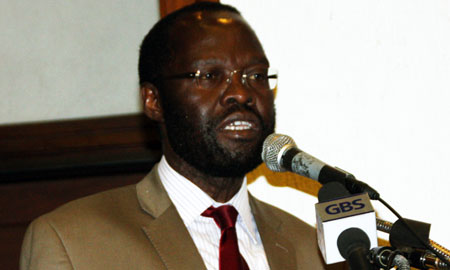The Health Policy Project ended in 2016. Work continued under Health Policy Plus (HP+) until 2022.
NEWS & VIEWS
Multisectoral discussion aimed at building consensus for new finance strategy to reduce out-of-pocket expense for healthcare for citizens
Posted September 10, 2012
 |
“The journey to universal coverage is long and participation of all stakeholders is critical,” said Hon. Prof. Anyang Nyon’go, Minister for Medical Services, during his keynote address at the Health Care Financing Stakeholders Conference in Nairobi, Kenya.
|
The new Kenyan constitution, enacted in 2010, outlines a framework to alleviate poverty, with a focus on improving governance and addressing inequalities in health, education, and economic growth. To ensure these goals are met, the government is in the process of revising health-related policies and regulations to strengthen the national healthcare system. During this period of transition, HPP is working with government and health institutions to develop effective and efficient financing mechanisms that maximize the country’s funding resources while expanding access to affordable, high-quality services.
During the meeting, the National Hospital Insurance Fund presented findings from a recent survey, which estimated that only 18 percent of Kenyans are covered by any form of health insurance. Out-of-pocket health expenditures account for approximately 40 percent of total health spending. This means that for many families and individuals, and especially among the poor, the costs of services are prohibitive and constitute a significant barrier to seeking care.
In his keynote address, Prof. Anyang Nyon’go, Minister for Medical Services, emphasized the need for broad participation among multiple sectors to build consensus and act swiftly in developing a new healthcare financing strategy. The Minister remarked on the progress of decentralizing funds to health facilities and the importance of strengthening the efficiency of county-level institutions to maximize these funding resources. Minister Nyon’go acknowledged that public financing alone cannot achieve the goal of universal coverage. He urged participants to explore new sources to raise additional funds, as well as develop a funding mechanism that will cut out-of-pocket costs to citizens.
Ms. Ngari, Permanent Secretary for the Ministry of Medical Services, assured stakeholders that the Ministries of Health are open to objective and technically sound proposals, which will enrich the process of developing and finalizing the draft health care financing strategy.
Mr. Kabati, Director General for Kenya Vision 2030—the long-term national development plan—pledged support to the Ministries of Health in developing a healthcare financing strategy and highlighted the need to consult the private sector and other arms of government to build consensus.
Dr. Tharworn, an expert on health financing from Thailand, attended the conference and shared experience from his country’s successful efforts to reach 80 percent of the Thai population with universal coverage for healthcare services. His presentation underscored the need for strong government commitment to provide leadership and direction to the process of attaining universal coverage.
While all countries have common health goals, he noted that there is no specific blueprint or model for Kenya to adopt. However, Dr. Tharworn illustrated the similarity of Kenya’s economy to that of Thailand at the time of his country’s commitment toward achieving universal health coverage and highlighted the importance of providing universal coverage as a way to reduce poverty. This approach was used in Thailand to help raise government expenditures on health programs to 14 percent of its total budget. He advised that it is possible to achieve universal coverage with multiple health schemes, but called for regulation and stressed the importance of examining the entire health delivery system rather than equating health care financing to raising money.
A representative from the National Hospital Insurance Fund (NHIF) made a presentation on the current reforms the institution is undertaking to increase coverage to its members. He indicated that despite Kenya’s large uninsured population, NHIF has increased its revenue base to Kshs 9.4 billion (US $111.4 million) and reduced administration costs to 32 percent from the high of 50 percent a few years ago. In order to further improve on governance and efficiency, the speaker said, NHIF intends to review the NHIF Act and requested support in this area. In addition, NHIF is eagerly waiting for the household expenditure and utilization survey to be conducted with the support from HPP to inform the development of an enhanced health benefit package.
In all, participants expressed optimism on the process of achieving universal health coverage with the use of NHIF as one of the mechanisms. Participants also agreed that the process needs to be consultative and transparent, with the government taking leadership.
The Nairobi meeting was an important step in creating a collaborative, transparent environment to develop an effective finance mechanism that will help Kenya provide high-quality healthcare to citizens. HPP will continue to provide support to government ministries, health institutions, and other organizations as they develop innovative and equitable financing strategies to enhance access to healthcare.
Read more about Health Policy Project program in Kenya
Presentations
Below are links to presentations made by officials and health experts at the Health Care Financing Stakeholders Meeting on August 30, 2012:
Ministry of Medical Services Presentation: Health Care Financing Reforms in Kenya (PDF)
National Hospital Insurance Fund (NHIF) Presentation: Expanding Insurance Coverage through NHIF (PDF)
Presentation: Universal Health Care Coverage through Pluralistic Approaches in Thailand (PDF)
What's New
- Something to Build On: “Innovation Exchange” Celebrates the Health Policy Project’s Close and a New Beginning
- What Will it Take for Tanzania to Achieve ART Targets and Ensure Long-Term Sustainability of the HIV Response?
- Helping Kenya’s County Leaders Advocate for Increased Health Investments
- HPP Holds Working Meeting on Ensuring Responsible PEPFAR Transitions for Key Populations
- Health Policy Project Celebrates 2016 International Women's Day
- HPP Staff Participate in White House Conference on HIV Stigma Reduction

